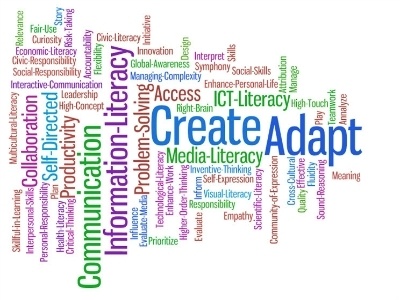How Relevant Is The Existing Grading System In The Era Of eLearning?
As a student, I hated how grades made my friends behave. High-achieving friends who were once sharing lunch were now hiding each other’s notes because they wanted to 'stay ahead'. Normal friends just wanted to pass, and as long as they didn’t score an 'F' they were fine. At risk students feared to get an 'F' so much that they occasionally failed.
Interestingly, none of my friends jumped these categories: the 'high-achievers' kept achieving highly, normal students stood at the center of the percentile and the 'F' students eventually disappeared or switched schools. So, if anything, one category entirely disappeared which begs the question: Is this the best we can do with all the tools at our disposal?
Some might argue that age doesn’t necessarily invalidate purpose. An analogy here would be that the GPA is like a thermometer for learning. GPAs measure student success, like a thermometer measures temperature. Thermometer, like the GPA, was created 200 years ago, and is still as relevant a tool as it was in its heyday.
Sure, but we are discarding the entire science of radiology when we say that. Once we had the technology of imaging, we developed advanced tools to diagnose advanced diseases. Once we did that we knew that rising temperature (fever) wasn’t a disease but a symptom. I feel those advanced tools for learning evaluation, are yet to come.
Origins Of The GPA
The very first collegiate grades ever given in the US is traced back to Yale in 1785. This assertion is made by examining the diary of then Yale president Ezra Stiles where he mentions 'grading' students in categories. Interestingly, 'grades' were just adjectives at the time and not a numerical measure.
The nail in the coffin was dug in 1817, almost two hundred years ago, when Mount Holyoke came up with the letter scheme "A-F", and it is reasonable to assume that experimentation stopped after that. If you’re interested in the details 'An A is not an A is not an A: A History of Grading' is a fascinating read on the topic.
Wearing Novelty Of The GPA
I would argue that at the time the usage of a standardized metric was perhaps a novel innovation. It brought administrative simplicity to the complex process of delivering education to a huge volume of students simultaneously.
It provided a single-metric which could be used by all stakeholders in the education value chain: teachers would use it to categorize and measure their pupil, students and parents to monitor progress and competency, institutions to measure their output and quality, employers to filter out candidates and governments to manage oversight.
Interestingly, ed-tech is subtly addressing some of the 'needs' of the GPA I mention above. For example, GPAs/Grades served as a tool for parents to monitor their child’s educational progress. Today, Learning Management Systems (LMSs) provide visibility to parents about their children in ways unthinkable in 1817 (think Canvas Parent).
It is certain that the examples I provided above aren’t conscious efforts to replace the GPA, but it does emphasize a key trend: there is richer data available on a student than 200 years ago. Another case in point is the usage of the GPA as a 'filter' for employers. Today, employers have started to utilize more sophisticated methods to filter candidates while some employers have even begun to regard the GPA as a worthless metric.
Weaknesses And Criticisms Of The GPA
The weaknesses of the grade point average system aren’t something new and I.E Finkelstein said it best when he regarded the GPA as an "absolutely uncalibrated instrument" in his 1913 book 'The Marking System in Theory and Practice'. Below is a short-list of what makes the grade point average a weak K.P.I.
Any improvements in the following areas via technology or data-science can definitely help calibrate grading.
Subjectivity
While being marketed to the student as an immutable number: a mark is just an opinion. The first, and often spoken about, problem with the GPA is that is subjective and is hence prone to literal and statistical bias.
Easy A
When students know that the output they will be ranked against is their GPA, there is an inverse moral hazard that they will pick-up less challenging courses just to get a higher grade and/or GPA. If learning is about self-growth, should taking risks be marginalized?
Penalises Knowledge Gaps
GPAs are based on assessments, and by their very definition assessments are meant to assess learning. If anything, learners who have more to learn will get lesser grades, and my contention is that instead of their knowledge gaps being filled, their lack of knowledge will go on their permanent record. If someone goes to school to learn, is it justifiable to rank them based on the mistakes they’ve made?
Allow me to draw a parallel comparison from software development; whenever we realize a new version we 'test' it. If a version fails a test, we don’t throw it away; we fix it until it passes it, and release it into the world. Hence, a test exposes vulnerabilities and vulnerabilities should be addressed not labeled.
Lack Of Sophistication
How accurate is a Grade Point Average (GPA) as a statistical measure? Not great, in fact, it’s average at best; get it?
When we average out credit hours over grades, we fail to incorporate a lot of significant factors such as the difficulty of each course, a student's progress within each course, the distribution of grades that particular year and not to forget we’re implicitly assuming normality in the underlying 'grade distribution'. If learning is about self-development, shouldn’t it follow that the yardstick that is used to measure should be growth-oriented as well?
The Future Of Grading
At a time when millions of dollars are being spent on adding Virtual and Augmented Reality to the classroom, I wonder if those dollars are really well-spent when the very tool we’re using to measure our output needs improvement. Furthermore, is it in our best interest to further 'automate' an uncalibrated instrument?
The purpose of a scoring mechanism is two-fold: To measure a student’s learning, and to rank them on those measures. Since life is unprecedentedly digitized today, we must ask ourselves, can we build better tools or systems to measure learning?
Others might argue that the entire value of GPA-esque metrics is in its administrative simplicity in classifying students. Let’s not forget that at a time, students were sorted according to the social positions of their families. That was administratively simple as well, but we upgraded, didn’t we?
All I’m saying is that grading is a concept we definitely need to revisit after we’ve invented such advanced data storage and manipulation capabilities. In the eLearning era where we are using data to radically optimize marketing and engineering dollars, the same shift isn’t being translated to education dollars. After all, what is a grade but one data-point in a possible sea of many?









